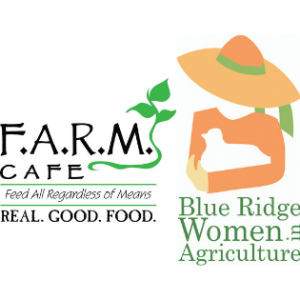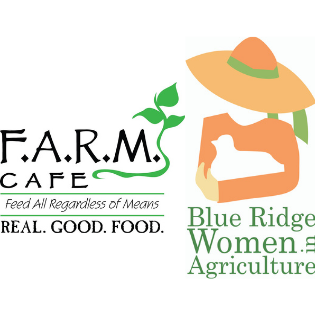This past fall semester, a community-engaged grant writing course for English majors assisted Blue Ridge Women in Agriculture (BRWIA) and F.A.R.M. Cafe in seeking funding to further each organization’s mission. Dr. Belinda Walzer, assistant professor, Department of English, led the course which introduces students to the process of grant seeking and proposal writing.
Walzer decided for the theme of the course to be dedicated to food insecurity issues, which both of the organizations address. BRWIA works to increase consumer demand for local food, ensure equitable access to high quality local food and provide producers with the support they need. F.A.R.M. Cafe, located in downtown Boone, is a non-profit pay-what-you-can community restaurant that operates primarily with volunteers. They prepare local food that individuals can enjoy regardless of means.
“Working with these really unique, local organizations that address food insecurity issues was hugely valuable. Some of the students were already interested in the topic and several of them then became interested in that through the theme of the course,” said Walzer.
Throughout the course, Walzer encouraged students to ask the following questions:
How do nonprofits understand and develop their missions and relationships to the communities they serve?
What is the role of nonprofits in a capitalist system and how do grant writers navigate soliciting funds for nonprofit organizations?
How do writers for nonprofits advocate on behalf of people who lack representation?
Walzer divided students into two groups, one assigned to BRWIA and one to F.A.R.M. Cafe. For each team, the primary goal was to research and seek new grant funding sources and submit a proposal to help further the organization's mission. Once the groups created the grant proposals, it was up to each organization to review and decide whether to submit.
Teams met virtually with the representatives and spent time researching their assigned organization as well as which grants were applicable to their goals. BRWIA’s goal was to push the organization to become more aware of anti-racist and diversity efforts and F.A.R.M. Cafe’s goal was to fund new equipment needed for the expansion of their food recovery and redistribution program. These specific goals were established in conjunction with representatives from each organization.
The team assigned to BRWIA prepared a grant proposal for a USDA Community Food Projects grant. This grant was chosen because larger USDA grants frequently come due at a time when BRWIA is stretched capacity-wise such as in the spring when preparations are being made for the summer growing season.
“The Community Food Projects grant also touches on several areas that students are excited to learn more about such as greater local food access for everyone,” said Dave Walker, development director of BRWIA.
While BRWIA did not end up submitting the USDA Community Food Projects grant proposal, the organization moved forward with a similar grant proposal to the Golden LEAF Foundation, a nonprofit organization established in 1999 to receive a portion of North Carolina’s funding received from the 1998 Master Settlement Agreement with cigarette manufacturers.
“We have since been awarded a grant through the Golden LEAF Foundation, and I think the work students did certainly influenced our organization's ability to put forward a strong application with Golden LEAF. The USDA's Community Food Projects is a regular grant opportunity, and we plan to apply in the future, using portions of the content that the students developed,” said Walker.
Commenting on the overall experience working with the grant writing students, Walker added, “working with Belinda Walzer's class was a joy because it brought a fresh perspective to our work. I'm regularly impressed with the professionalism of Appalachian students. The students in our community are engaged in our broader High Country community and beyond. They are invested in making our community and world a better place. I think that matters and is special.”
The team assigned to F.A.R.M Cafe created a grant proposal for the Clif Bar Foundation to fund their new equipment.
Commenting on the grant writing course, Elena Dalton, the program director of F.A.R.M Cafe said, “F.A.R.M. Cafe is grateful for classes such as Belinda Walzer's grant writing course for their interest and support of our mission to feed all regardless of means. The student's assigned to partner with F.A.R.M. Cafe last semester were dependable, focused and engaged in learning about our work fighting food insecurity in the High Country. The grant was later submitted by program staff and notification of an award is pending later this spring. We look forward to continuing to partner with Appalachian and its students in the future.”
The Student Experience
Junior English majors Kara Haselton from Raleigh and Daniel Wartham from Charlotte were on the team that created a grant proposal for BRWIA.
Commenting on her experience in Walzer’s course, Haselton added, “what I appreciated most about this course was Dr. Walzer's approach; while it was a class that I was receiving a grade for, she created room for us to not be afraid to fail or worry about the grade, rather simply to focus on learning from the experience and responding to any issues that came up. Because of this freedom, my group was able to find solutions to our issues with confidence that we were supported regardless of what happens. This created a much more holistic and lasting learning experience, one that will benefit me for years to come. While challenging, this experience taught me a lot and I'm thankful to Dr. Walzer's guidance and encouragement through it all.”
Waltham also commented “my favorite aspect of the project, and of the class in general, was the autonomy that Dr. Walzer gave us which allowed us the freedom to navigate grant writing with the best approach for us individually, while still being able to not stray too far from the course objectives. I gained quite a lot from this course, including the maturity to approach outside community members with confidence, the ability to better communicate my ideas with multiple different moving parts to different individuals, and how to better frame grant proposals for the needs of an organization from conception to a deliverable grant proposal. I cannot stress enough how wonderful Dr. Walzer is as an instructor and a guiding force to grant writing.”
These reactions were what Walzer had hoped students would take away from the course.
“I certainly think these students walked away with huge insight into the specifics of grant seeking and writing. Making the course community-engaged, students also had the benefit of working really closely with a community partner,” said Walzer.
###
About the Department of English
The Department of English at Appalachian State University is committed to outstanding work in the classroom, the support and mentorship of students and a dynamic engagement with culture, history, language, theory and literature. The department offers master’s degrees in English and rhetoric and composition, as well as undergraduate degrees in literary studies, film studies, creative writing, professional writing and English education. Learn more at https://english.appstate.edu.
By Sophia Woodall
June 1, 2021
BOONE, N.C.

